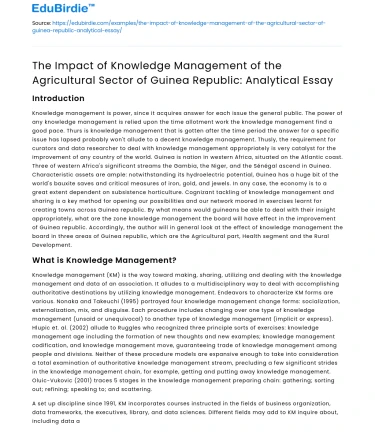Introduction
Guinea, a West African nation with a strong agricultural backbone, is increasingly recognizing the crucial role of knowledge management (KM) in revolutionizing its agricultural sector. Knowledge management, defined as the systematic process of creating, sharing, using, and managing the knowledge and information of an organization, holds the potential to transform Guinea's agriculture by improving efficiency, productivity, and sustainability. Despite abundant natural resources, including fertile land and favorable climate conditions, Guinea's agricultural sector has struggled due to inadequate infrastructure, limited access to market information, and outdated farming practices. This essay examines the impact of knowledge management on Guinea's agriculture, analyzing how effective KM practices can enhance productivity, overcome existing challenges, and contribute to economic growth. By exploring real-life examples and counter-arguments, this essay aims to underscore the transformative power of KM in fostering agricultural development in Guinea.
Enhancing Productivity Through Knowledge Management
The integration of knowledge management practices within Guinea's agricultural sector can significantly enhance productivity levels. By leveraging KM, farmers can access and utilize valuable information on modern agricultural techniques, pest control methods, and climate-resilient crops. For instance, the adoption of precision agriculture, which relies on data-driven insights to optimize farming processes, has shown promising results in countries with similar agricultural profiles. According to a study by the Food and Agriculture Organization (FAO), countries that embraced KM practices experienced a 20-30% increase in crop yields due to improved decision-making and resource allocation (FAO, 2020). In Guinea, where traditional farming methods predominate, introducing KM can facilitate the transition to more efficient and sustainable practices.
Save your time!
We can take care of your essay
- Proper editing and formatting
- Free revision, title page, and bibliography
- Flexible prices and money-back guarantee
Furthermore, knowledge-sharing platforms can connect Guinean farmers with agricultural experts, researchers, and extension services. This connectivity allows for the timely dissemination of critical information, such as weather forecasts and market trends, enabling farmers to make informed decisions. The establishment of farmer cooperatives and digital forums can also facilitate peer-to-peer learning and collaboration, fostering a culture of continuous improvement. A case in point is the success of the "e-Granary" initiative in East Africa, which uses mobile technology to provide farmers with real-time information and advisory services (World Bank, 2021). By adopting similar KM strategies, Guinea can enhance the productivity and resilience of its agricultural sector.
Overcoming Challenges with Knowledge Management
Despite its potential benefits, the implementation of knowledge management in Guinea's agriculture faces several challenges. Limited access to technology and the internet, especially in rural areas, poses a significant barrier to effective KM adoption. According to the International Telecommunication Union, only 23% of Guinea's population had access to the internet as of 2021 (ITU, 2021). This digital divide restricts farmers' ability to engage with online knowledge platforms and limits the dissemination of agricultural innovations. Addressing this challenge requires concerted efforts from the government, private sector, and international organizations to improve digital infrastructure and connectivity in rural regions.
Moreover, there is a need to address cultural and educational barriers that hinder the adoption of KM practices among farmers. Many Guinean farmers may be resistant to change due to deeply ingrained traditional practices and a lack of awareness of the benefits of KM. To counter this, targeted training programs and workshops should be implemented to educate farmers on the value of KM and equip them with the necessary skills. The success of such initiatives is evident in countries like India, where government-led training programs have successfully increased farmers' adoption of KM practices, leading to higher productivity and income levels (Singh et al., 2019). By overcoming these challenges, Guinea can harness the full potential of knowledge management to drive agricultural transformation.
Counter-Arguments and Rebuttals
While the benefits of knowledge management in agriculture are evident, some critics argue that the focus on KM may detract from addressing more immediate needs, such as infrastructure development and financial support for farmers. They assert that without addressing these fundamental issues, KM initiatives may have limited impact. However, it is essential to recognize that KM can complement and enhance other agricultural development efforts. For example, by improving access to information and fostering collaboration, KM can streamline resource allocation and optimize the use of existing infrastructure. Additionally, KM can facilitate the dissemination of financial literacy programs, empowering farmers to make informed decisions regarding investments and resource management.
Critics also contend that the reliance on technology-driven KM solutions may exacerbate existing inequalities, particularly among smallholder farmers with limited access to digital tools. While this concern is valid, it underscores the importance of adopting a holistic approach to KM implementation. By combining traditional knowledge-sharing methods, such as community workshops and field demonstrations, with digital platforms, Guinea can ensure that KM benefits are accessible to all farmers, regardless of their technological capabilities. This inclusive approach can help bridge the gap between different farming communities and promote equitable agricultural development.
Conclusion
In conclusion, knowledge management has the potential to significantly impact Guinea's agriculture by enhancing productivity, overcoming challenges, and fostering sustainable development. By leveraging KM practices, Guinea can empower its farmers with valuable information, improve decision-making processes, and facilitate the adoption of modern agricultural techniques. Although challenges such as limited digital access and cultural resistance persist, targeted efforts to address these issues can pave the way for successful KM implementation. By integrating KM into a broader agricultural development framework, Guinea can unlock the full potential of its agricultural sector, contributing to economic growth and food security. Ultimately, the successful integration of knowledge management in Guinea's agriculture will require collaboration among government, private sector, and international stakeholders to create an enabling environment for innovation and knowledge sharing.






 Stuck on your essay?
Stuck on your essay?

